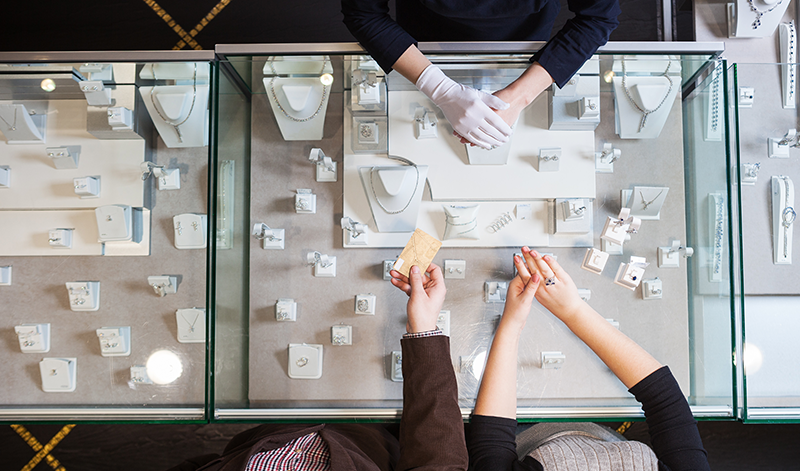
Do you know what the weakest spot in your security is?
Whether you have a firm answer or not, chances are criminals could probably recognize it fairly quickly. When they do, they'll go along a path of least resistance to exploit it.
Even if you have strong jewelry store security, criminals can get creative and use trickery to commit their crimes. Theft is a common tactic, but robberies and burglaries can also occur if your procedures become careless. Prevent those crimes from happening by watching out for situations where criminals try these schemes.
Tricks Criminals Use to Undermine Jewelry Store Security
1. Posing as an upscale client
This is of particular concern to jewelers who use locked door buzzer or mantrap system to control entry into their businesses.
Even with a sound operating procedure in place, it's difficult to find a reason to deny a sharp-dressed man wearing a suit and sunglass. Unfortunately, it's also hard to determine if the man is carrying a gun and has intentions to commit an armed robbery.
|
What can you do? If you carry highly valuable and commonly targeted merchandise like luxury watches, try working by appointment-only, at least for the items that you're concerned about. The services of a security guard will present an active deterrant to potential criminals, too — especially in the form of an armed, off-duty police officer. |
2. Posing as a delivery or repair person
This can be a danger to both retailer jewelers, and manufacturers, wholesalers, and designers.
The concern doesn't originate just as a robbery threat, either. Someone posing as a courier could convince you to voluntarily part with a parcel you're about to ship, or steal merchandise that's not secured in a safe or showcase.
Besides theft, burglary is also a concern. Allowing a phony repair person to inspect your business means that they could tamper with your alarm and surveillance system.
|
What can you do? Only allow contractors you've made appointments with on your premises and require that they show you identification beforehand. Have someone with them at all times if they are in an area of your premises where merchandise is present. |
3. Attempting to buy over the phone or online
As in-store jewelry sales fluctuate and other businesses in the industry close, it can be hard to say no to an easy sale that calls or sends in an email.
These inquires often work like this:
- Typical items are requested
- The customer is not local
- They offer to give you a credit card number
- An excuse is used to ship it urgently
In some cases, fake IDs will even be scanned to match the card to make the transaction appear more legitimate. What's more, if you process their transaction the first time, the fraudster will likely place another, larger order quickly after the original.
|
What can you do? Remember that credit card fraud is not covered under a normal jewelers block or businessowners policy! If you consider the implications of a loss where there is no coverage, you'll likely take the preventative procedures more seriously. Even with chip-and-pin card terminals, the bottom line is never do business over the phone or via email and when transactions are done in-store, always verify customers' identity. Furthermore, you should refrain from forcing transactions through. |
Want to learn more on how you can keep your jewelry store safe 24/7? Read our comprehensive Jeweler Security Guide by clicking the button below.
